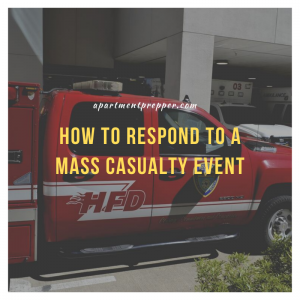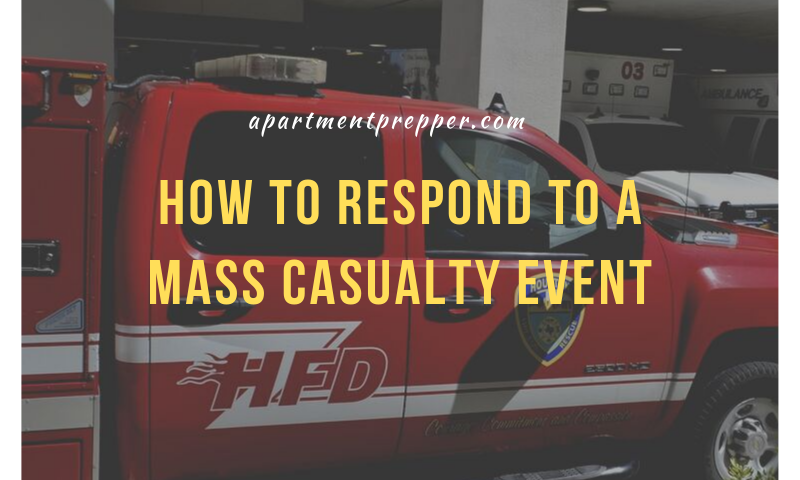Written by: Kayla Matthews
As a prepper, you spend a lot of time preparing for any number of world-ending contingencies.
Natural disaster, nuclear war, natural or engineered plagues, the zombie apocalypse or any combination of the above might sneak up on you and end the world. You store food and water and learn first aid and other skills that will help you survive when and if the country’s infrastructure collapses.
Most people don’t think about mass casualty incidents, or MCIs, outside the context of responding to apocalyptic events. Here’s a closer look at these MCIs, so you can learn to understand how best to respond to them.
What Is an MCI?
First, what is a mass casualty event? Experts define an MCI as “any event that overwhelms the local health care system, where the number of casualties vastly exceeds the local resources and capabilities for a short period.” This definition is expansive, but the concept is challenging to define numerically.
An accident that puts 50 people in the hospital might not be an MCI if the facility can handle that many patients without impacting the usual day-to-day care it provides. On the other hand, five patients in critical condition could be an MCI in a small-town hospital that lacks the equipment to offer that sort of care.
We see these events in the news all the time, though they aren’t always called MCIs. The devastation Hurricane Dorian left in its wake in the Bahamas falls under the definition of a mass casualty event.
The hurricane destroyed much of the infrastructure — including medical services — on Grand Bahama and Abaco Islands. Most mass shootings that have occurred in the United States over the past few years have been MCIs. Even a scenario such as a two-person EMS crew responding to an accident with three severely injured individuals could be an MCI.
Planning for an MCI in Your Area
Why is it essential to have a plan in case an MCI happens in your area? You’re not going to want to try to drive to the hospital to seek care during a mass casualty event, even if they don’t turn you away at the door and reroute you to other nearby facilities. You won’t be able to get the care you need while the overcrowded facility is tending to other, more critical patients.
Every emergency response provider, from hospitals to EMS, police and fire, all have MCI plans in place in case something happens. You should, too. Your response plan might be as simple as “stay home and safe until it’s over,” or, depending on your training, you may find yourself called to duty to assist.
How to Respond to an MCI
How should you respond if you get caught up in an MCI? For the average person, preparing for an MCI is just like preparing for any other emergency — have all your supplies in order, and either evacuate or ride it out, depending on the circumstances. If you happen to get caught up in the middle of one of these events, there are a few things you should remember.
If you’re injured, you will get tagged with one of four colors, depending on the severity of your injuries as assessed by the triage nurses who attend you. Red tags require immediate treatment, or they likely won’t survive. Yellow tags indicate injured individuals who can last for a few hours before treatment is necessary, allowing the medical professional to get to the red-tagged patients first. Those with a green tag are the “walking wounded” — you need treatment, but you can walk and talk and will be among the last to receive attention.
Black tags are for those who have already died or patients who have a low chance of survival.
If you have a tag, don’t leave the scene. The treatment team has already put you into the system, so they’re expecting to find you waiting for care. Even if you don’t need medical intervention, they may still ask you to stay nearby to give witness statements or to assist wherever possible.
If you’ve got any medical background whatsoever, you may find yourself conscripted to take names and assist with triage. If you’re not injured and have a medical background, try to speak to the person in charge to see where you can help. You might not be bandaging the wounded or assisting with surgery, but in an MCI scenario, emergency services need every pair of hands they can get.
Don’t panic. MCIs might overwhelm local medical resources, but every emergency service has a plan in place to prepare them for these events. They’re stressful and often heartbreaking, but panicking won’t help anyone.
Always Be Prepared
No one wants to think about what they would or should do when caught up in a mass casualty incident, but they do happen. The best thing you can do when facing an MCI or any emergency scenario is to stay calm and rely on your preparedness.
 Kayla Matthews is a journalist and writer interested in digital technology, safety and data privacy. To read more from Kayla, please visit her blog, Productivity Bytes.
Kayla Matthews is a journalist and writer interested in digital technology, safety and data privacy. To read more from Kayla, please visit her blog, Productivity Bytes.


